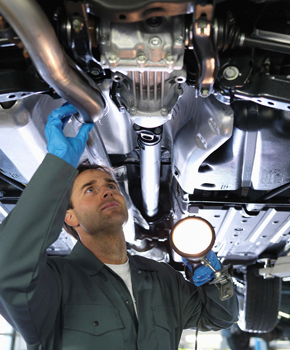December 6, 2016

Your car’s exhaust system is an important feature, one that offers many protections. It not only works to keep you safe, but it also protects the environment and ensures that your vehicle is getting the best possible gas mileage.
For your car to operate properly, fuel and air are burned up within the combustion chamber. Your vehicle’s exhaust system converts the harmful gases that form during this process into inert ones. It then sends the gases through the muffler or silencer to decrease noise pollution.
The fumes that form when your car is running may be dangerous to you and your passengers. They can also be deadly to anyone who is exposed to them in unventilated areas. In fact, because fume danger is acute, regular checks and exhaust system maintenance are required to ensure your safety. If you smell exhaust fumes inside your vehicle, roll the windows down immediately and head to the nearest trustworthy mechanic.
When your vehicle undergoes a safety check, the mechanic will make sure that there are no breaches in the exhaust system or within the vehicle’s interior that would allow fumes to enter. During the safety check, your mechanic will also look for broken clamps as well as rust or damage to the muffler and tailpipe.
By keeping your car’s exhaust system well maintained, you’ll be protecting the environment. The exhaust system decreases the amount of emissions that your car expels, which makes it run cleaner. Before sending fumes out into the open air, your vehicle’s catalytic converter cleans them. Over time, this part will break down, so it is one that you should plan to replace. The catalytic converter is usually pricey, but you can make it last longer with regular system maintenance and by replacing your air filter when needed.
Most exhaust systems fail due to corrosion. Rust develops in the system because water vapor exists within it as a result of the combustion process. General air moisture and even rain can speed up corrosion.
If you drive short distances frequently, more moisture will be present in the exhaust system, which increases the likelihood of rust forming. Once you shut your car’s engine off, it won’t have had enough time to heat up sufficiently to burn off the moisture that’s developed. Condensation occurs and this causes corrosion. If you live in a state that uses salt in the winter, then this could also trigger the formation of rust.
With regular maintenance, not only will your exhaust system likely last longer, but you will also decrease the amount of fumes that are entering the environment.
Tags: Exhaust System
Hello {{User.FirstName}} {{User.LastName}}.
You are logged in with email {{User.Email}}.